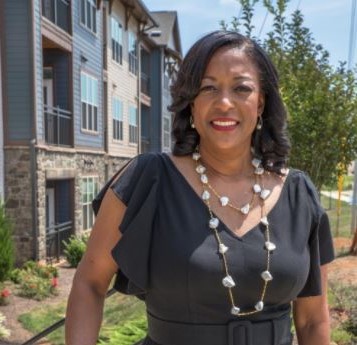“We are hoping to double our team and capacity over next year and a half,” Nelson says. “Mixed income housing doesn’t fall off. We have felt the slow of Covid, but we are busy and there’s a very big opportunity for us to scale so we can do more.”
Nelson, who holds an MBA from Harvard, worked as a management consultant and finance professional before joining venerable Charlotte real estate firm Crosland in 2007. Nelson says Todd Mansfield and Jud Little helped her learn the development business and the complexities of affordable housing.
“Those types of opportunities don’t naturally occur for people who look like me,” Nelson says. “I had an awesome professional start in terms of learning from experts in the field.”
Then the real estate development market crashed.
What led you to start your business?
By 2010, Crosland made the decision to exit development. At the same time, I had developed the strongest pipeline of affordable housing projects in the company’s history. We had an amazing pipeline, but we were trying to develop it under a corporate umbrella that could not support development. I could walk away and have that pipeline collapse or try to start an independent development company focused on mixed-income housing. Prior to that time, I had not explicitly desired to start my own development company. It was really a decision out of necessity. I do think market challenges similar to what we are experiencing today with the pandemic push people to make choices that can result in awesome career opportunities. The same professionals helped me think through how to do this, and we launched in 2011. We closed four transactions in 2012. We were a startup, but because of our pipeline we really didn’t function like a startup. We have grown pretty dramatically over the years. Our pipeline is as amazing as ever.
What challenges have you faced in business?
I had to raise capital to start the business. That was not something I had done in my career previously. It is challenging, particularly for people of color. I didn’t have the same friends and family network that other people might have. My access to capital has been heavily dependent on having made a positive impression on other professionals who chose to help me. My initial investor at launch was John Crosland Jr. before he was seriously ill. Others who have helped me along the way have been Hugh McColl Jr. I have been lucky enough to be exposed to some very successful professionals who I believe have come to respect my work. They individually made choices on how to help. That moved the needle for our company. Most minority entrepreneurs still need that kind of help. I have called on those supporters who literally picked up the phone and said Dionne Nelson is trying to get approved for a loan. We operated for those first four or five years off of high net worth capital, borrowed or invested capital, that was not from my friends and family.
What has your firm accomplished?
Young, market rate developers are not particularly interested in affordable housing work. It resonated with me. I became excited about learning about the business and doing the work to have an impact on so many people’s lives. Real estate development by its nature is about investing typically private dollars for a return on creating places. Affordable housing is a bit counter to that. I have always believed you can do good and do well at the same time. I have to balance my professional talents with a more altruistic outcome in the world. Nobody does affordable housing development if you don’t believe the mission because it’s too hard.
With groups such as CLTBlackOwned, there’s a movement to support black-owned businesses. Are you seeing any positive impact from this?
The next step for me is on minority spending and being intentional with whom we do business. Is it a minority architect, attorney, subcontractor? If it’s a $15 million project, that money is going to get spent in the marketplace. What can we do to spend with minority partners?
What about minority participation?
What I have learned the hard way in this business is when I don’t ask the question, I don’t get any minority participation at all. We are still at a place in society that if it’s not required by some it will get ignored. I am asking partners to be intentional about diversity. There has to be some capacity building that will open opportunity. If the minority contractor does not have the capacity to paint 100 units, maybe we break the contract in two and have 50 units and 50 units.
How do we improve racial and economic equity?
I think there has been a lot of conversations about how do we help small businesses. That is important. But it’s also important to think about how we help midsized businesses. The trickle down as a business scales is bigger. If you have more midsized to large businesses that have a philosophy to trickle down, they will open the door to that many more business. If all of our focus is on small businesses, that is great for mom and pop and I support that, but they don’t have the capacity to affect six or eight or 10 businesses.

